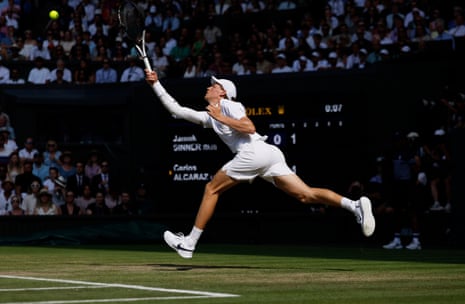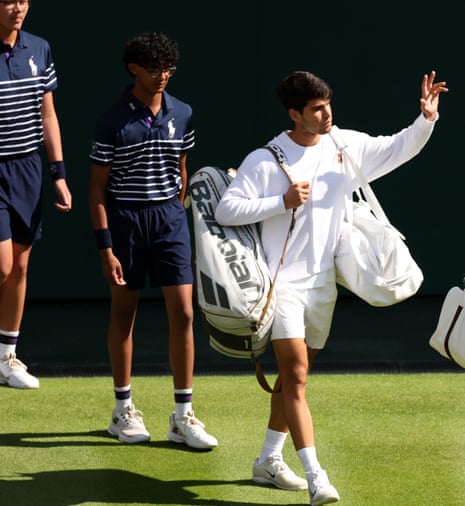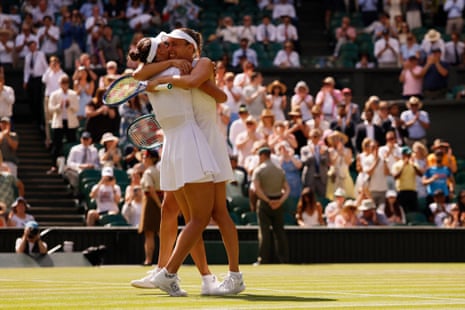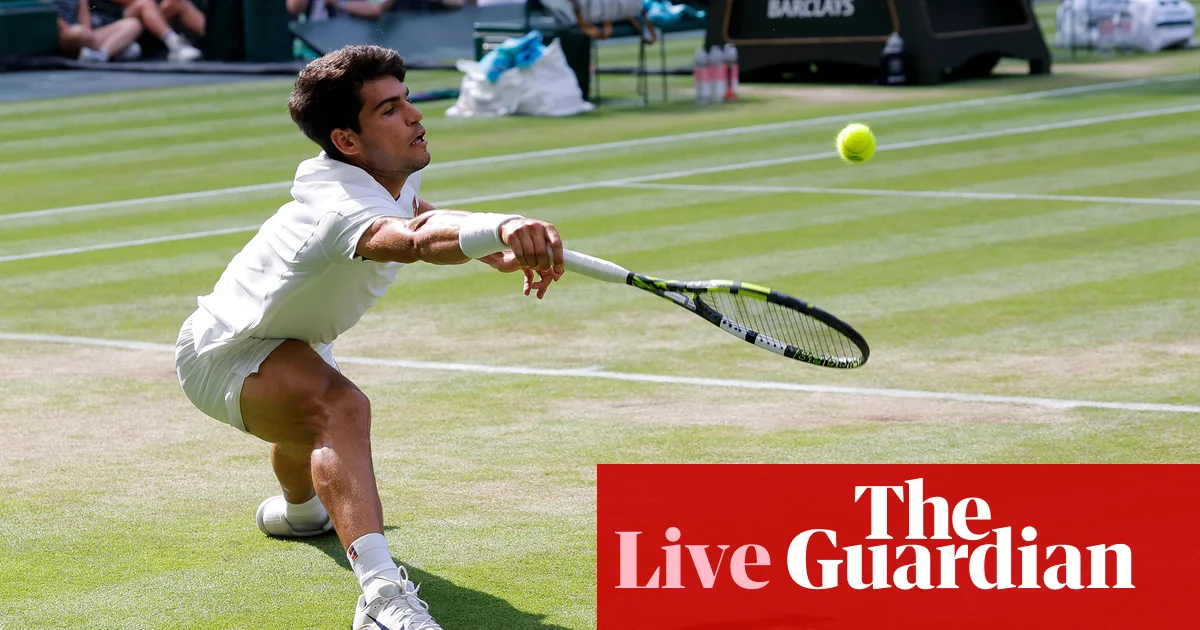Show key events only
Please turn on JavaScript to use this feature
Show key events only
Please turn on JavaScript to use this feature
Sinner 4-3 Alcaraz* Up 15-0, Alcaraz overhits a forehand, but a service-winner restores his advantage in the game, then he plays perhaps his best point so far twice running around his forehand to punish shots to the corner. And though the drop with which he seeks to finish the next rally sits up, Sinner sends his pick-up wide, so the gap is back down to one… but can Alcaraz find a break back?
*Sinner 4-2 Alcaraz You get the sense that Sinner, though he knows he can be caught, will have to win this from the front. He quickly makes 30-0, but then slaps a forehand cross wide; he looks to be targeting Alcaraz’s forehand, looking to turn the strength against him by putting it under pressure and deciding when it should be in the game. But another error means we’re at 30-all, and these are key points coming up; Sinner takers the first by doling out an industrial helping of own medicine, a drop hauling Alcaraz to net, and though the get is great – he’s so, so quick to anticipate and to move – the volley is well despatched, an ace follows, and the break is endorsed.
“Like Joe Pearson,” begins Rob Lewis, “I also saw the band Spirit at about the same time, but at Kingston University (then Kingston Poly). They were led by the amazingly named Randy California, later to be drowned and supposedly eaten by a mudshark when saving his 12-year-old son in Hawaii.”
Sinner 3-2 Alcaraz* More like it. Sinner nails a backhand on to the sideline, securing the first 0-15 of the match with a deft volley. Then, at 15-all, Sinner comes in when a ball lands short … only to find himself stranded by an excellent backhand pass down the line. But his aggression continues; he again comes in off a short ball to make 40-30, and we wind up at deuce then, sent wide to return, Alcaraz nets when he shouldn’t; the first break point of the final goes to Sinner, who gets a look at a second serve, lands a backhand on to the line, and Alcaraz strays long! The Italian lands the first significant striker, and we now know his gameplan: aggression.
“I was talking to Todd Woodbridge the other day,” says Coach Calv. |”He’s won the men’s doubles nine times and a mixed once. More titles (singles and doubles) there than any other man. He’s also told me won every doubles title there that a male can win, men’s, mixed, juniors and vets. Said he tried to become a member so he could win the club champs as well but they won’t let him.”
As we said earlier, sportsfolk are built differently
*Sinner 2-2 Alcaraz In comms, Tood Woodbridge reckons both players are a little early on the ball, snatching at things because they’re nervous. And that makes perfect sense – we’ve yet to see much in the way of rallies or winners, exchanges ended by errors before they’ve a chance to develop. Sinner holds to love, and we’re still in the phoney war stage.

Jannik Sinner in action. Photograph: Stéphanie Lecocq/Reuters
Sinner 1-2 Alcaraz* A lovely measured forehand, coaxed inside-out into the corner, makes 15-0, an unreturned serve 30-0. Alcaraz has started the better and more confident player, but consecutive errors turn a straightforward hold into something less convincing … then a monstrous first serve secures the game.
*Sinner 1-1 Alcaraz Having elected to receive, there’s pressure on Sinner, and when he nets a backhand for 15-all, he’ll be cognisant of that. Alcaraz, though, helps him out by swatting a forehand long, and we see a shot of Andre Agassi, whose commentary so enriched his semi with Fritz. Sinner then nails an ace for 40-15, but when he overhits, at 40-30 his opponent has a sniff … so his unleashes a high-kicking service-winner down the middle and we’re level at a game apiece.
The offending cardigan:

Photograph: Ezra Shaw/Getty Images
Sinner 0-1 Alcaraz* (*denotes server) Alcaraz opens up with an ace down the T and a service winner follows. Sinner then nets a backhand, goes long with another, and a love hold is secure.
First set, Carloz Alcaraz to serve. Ready … play.
Sinner won the toss and, as Alcaraz tends to do so perhaps because Alcaraz tends to do, he opts to receive.
“Since you brought it up,” begins Joe Pearson, “my first concert was 54 years ago. It was Spirit supported by Rastus. Spirit was touring the classic ‘Twelve Dreams of Dr. Sardonicus’, but I mainly went to see Rastus, a horn band in the mould of Chicago, but cooler, and quite popular at the time throughout the Midwest.”
Ambrose and the players pose for photos, then they pose just the two of them, and this is one of the fiercest friendly rivalries I’ve ever seen, needle completely absent.
Ah this is lovely. Ambrose Caldecott, an 11-year-old boy with bone cancer, comes out to a rapturous reception and will take charge of the coin toss. Godspeed, old mate.
Our players move through the clubhouse, past the portraits, down the stairs, past the portraits. The enormity of the situation is inescapable and Sinner tries to force a smile across his face, reminding himself he’s just a bloke doing his thing and there’s nothing unusual going on here. He stands in front, as the challenger; behind him, the champ bounces … then the doors open, the move under the Kipling quotation, and out they come! The scene is glorious.
Er, all bets are off. Carlos Alcaraz is wearing a … cardigan?
I take back everything I ever said or felt.
Both men, of course, had a match earlier in the competition that they might’ve lost – Alcaraz, playing poorly, almost lost to Fabio Fognini in round one, while, in round four, Sinner was showing no signs of coming back when two sets down to Grigor Dimitrov, only to be saved by a torn right pec. Both moved on as if nothing untoward happened, which tells us plenty about the mentalities of these two freaks of nature.
On the face of things, the music of Black Sherif has little to do with the Wimbledon men’s final. But both he and it are in the business of spreading joy and love, so please allow me to advise that, last week, I enjoyed the ridiculous privilege of watching Blacko perform live.
I went to my first gig – REM and Radiohead, now that you ask – 30 years ago this summer, and I’ve seen a bit since then, so please feel free to believe me when I say I’ve never, ever, seen a crowd respond to an act they way this one responded to that one. If there’s a better recording artist in the world, I’m not familiar with him, her or them, and if there’s been a better album this year than Iron Boy, I’ve not heard it.
But don’t take my word for any of this – here’s your Blacko starter pack, by way of definitive playlist.
Oh man, we’re nearly there. This is colossal.
It’s funny, really – we all seem to be agreed that this match-up is ridiculously close, yet do we all also seem agreed that Alcaraz will win?
Meantime, Mac tells us he still thinks about losing the 1984 French Open final to Ivan Lendl from two sets up, so it seems unlikely that Sinner has put away that which happened just last month. Iguess the question is not whether it’s on his mind now, but whether it mithers him once he’s on the court.
One thing these two have in common: Coach Calv messaged me after seeing both for the first time, saying he’d seen something special. Others of whom that is so: Francis Tiafoe, Felix Auger-Aliassime and João Fonseca; fantastic juniors don’t always train on.
“All the indicators point to Alcaraz,” reckons Gregory Phillips, “but only marginally. He has the psychological edge from his comeback at the French and the surface advantage given he’s the two-time defending champion. Sinner has the ruthless consistency, but Alcaraz has the game-changing brilliance. What a joy to get to watch this.”
What I most enjoy, or at least what I’m most enjoying this second, is the security of it: for the next decade, these boys have got us.
“Fritz was asked to compare the two after the semi-final,” writes Kerrith Britland. “He said something along the lines of Sinner is more predictable but a more consistently big ball striker, while Alcaraz has more access to angles but can go massive too.
While I think the RG loss would’ve been tough to swallow for Sinner, I don’t think he expected to do as well as he did after the three months out and against Alcaraz on his favoured surface. I reckon he wants this one bad though. With that Dimitrov bullet dodged, Sinner might think the powers that be are on his side today.
Enough from this arm-chair analyst … what’s your tactical take on this one?”
These days, Wimbledon grass isn’t that dissimilar from a hard court, and I expect Sinner to play as though that’s the case. He’ll structure poionts to get his forehand going and look to unleash it, down the line in particular whenever he can. Alcaraz, meanwhile, will hope to keep the Italian moving, forcing him to hit on the run and from outside the tramlines, while hauling him into the net whenever possible. I think Alcaraz will do it because he can make Sinner uncomfortable; I’m not sure the same is so in reverse.
“It was 1990, I think,” begins Krishnamoorthy V. “It was a double Sunday bonanza: Edberg – Becker followed by the World Cup final. We had assembled in our friend’s home. A friend who was not interested much in sports, and who had cone primarily for food and entertainment, said ‘Let anyone win so long as it is five sets’. I never understood him, till today. This is exactly how I feel.”
We learnt recently that Becker was struggling with a sleeping pill situation, which is why he lost the first two sets so convincingly – that feels unlikely today. But yup, I guess in individual sports, people – generally speaking – are less partial about who wins, and more partial about their desire to see something beautiful. We could not be in better hands.
A fantastic win in a belter of a match for the pair who only started playing together again recently. For the winners, ecstasy; for the losers, desolation.

Russia’s Veronika Kudermetova and Belgium’s Elise Mertens celebrate winning their women’s doubles final against Latvia’s Jelena Ostapenko and Taiwan’s Hsieh Su-wei. Photograph: Andrew Couldridge/Reuters
“SinAraz or AlcaSin, says Mohammad Feroze. “SinAraz sounds like a prison and AlcaSin sounds like a medicine.”
SinCaraz?
For my part, I’d back Alcaraz on the surfaces that move underfoot – grass and clay – and Sinner on more predictable hards. But there’s so little between them that whoever plays closer to their best is likely to be the determining factor and, given his game has less about it that can go wrong, it’s tempting to fancy Sinner. But it’s hard to back Alcaraz to lose a major final when he’s won five from five; if he gets in front, he’ll be very difficult to stop, and if he’s behind, there’s always the sense he can come back.
Back to our match, Coach Calv Betton messages in wiIth his breakdown: “It’s not a tactical battle between those two, it’s ball striking. They’ll both try and hit the ball hard. There isn’t much nuance. Occasionally, they’ll both do something different to mix it up – a drop shot, a serve-volley. And someone will make out that it’s a pre-planned strategy to break the other guy down. It’s not. It will just be random and nothing’s really changed since the French Open so I don’t see it playing out differently.”
We’re scheduled to get going at 4pm, but on court currently we’ve the women’s doubles final; Ostapenko and Hsieh lead Kudermetova and Mertens 4-2 in the third.
Email! “The rivalry to rival Fedal – now we have SinAraz or AlcaSin. Hopefully these two will give us a banger of a five-setter. Too close to call but I’ve a feeling Carlos will hit the hat-trick of SW19 wins This could be emotional and physical carnage for the players and fans. Enjoy it.”
It’s funny isn’t it – these two have only played one major final against each other, yet no one could say with any certainty when there might next be one they’re not in. The difference between them and the rest is monumental, the difference between them is marginal.
Also going on:
England v India: third men’s cricket Test, day four – live
Tour de France 2025: stage nine from Chinon to Châteauroux – live
We all lie to ourselves all the time, inventing stories to make ourselves look better or look worse, feel better or feel worse; to explain the haphazard chaos we call life.
Sportsfolk, though, have turned this routine into an art. How else could they perform fine motor skills, under pressure and exhausted, in front of a crowd offering feedback in real time?
Consequently, when we hear Jannik Sinner say he’s over losing the French Open final, from two sets and three match-points up, we can sort of believe him. As the psychological axiom has it – an antidote to so many of the grudges, injustices and disappointments we let needlessly weigh us down – “that was then and this is now.”
But as Sinner prepares to meet Carlos Alcaraz again, are we seriously to believe the scarring has no impact? That his first Wimbledon final, facing the man who crushed his dreams in Paris, is just another match, irrelevant to anything which precedes it?
Because what to us is narrative, to Sinner is pain – and a problem to be solved. Against everyone else, he’s dominating almost all of the time; against Alcaraz, he’s lost five times in a row. If the key to stopping him isn’t to be found in their previous contests, does it even exist?
Sinner will argue the answer lies with him, not with his opponent. The margins are thin, so if he can impose his considerable strengths at the crucial moments – if he can perform those fine motor skills, under pressure and exhausted – it shouldn’t matter what his opponent does.
This is a clever way of looking at the world – we have no control over others, so all we can really do is deliver the best of ourselves and hope for the best – all the more so when confronted by an arch improvisor like Alcaraz. Often, even he won’t know what he’s going to do until he’s done it so, rather than predict him, it makes more sense to rush, hamper and crowd him.
The problem Sinner has is there’s a fervency about Alcaraz that is almost religious. He has no sense of his own fallibility, convinced by the mystical power of his own talent and creativity – with good reason. He knows he can win Wimbledon, he knows he can beat Sinner on the biggest occasion and he knows he cannot lose a grand slam final; he knows he is Carlos Alcaraz, who makes the impossible possible. Which is, of course, a lie he tells himself, but it is a lie which is true; that was then and that is now.
Meantime, the rest of us can simply look forward to a match-up that is already one of the classics. The Roland Garros final was one of the greatest ever, in any sport, and nothing about these two, as individuals and as rivals, suggests they won’t invent another epic story to elevate the haphazard chaos we call life.
Play: 4pm BST
